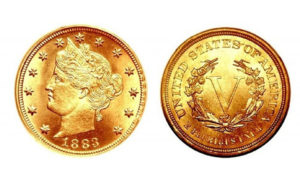 Josh Tatum’s infamy straddles three centuries thanks to a financial scheme that apparently netted him $15,000 and inspired the U.S. Treasury Department to recall and then re-design the Liberty Nickel.
Josh Tatum’s infamy straddles three centuries thanks to a financial scheme that apparently netted him $15,000 and inspired the U.S. Treasury Department to recall and then re-design the Liberty Nickel.
If you’ve ever used the phrase “just joshing around”, you’ve referred to Mr. Tatum.
Young, enterprising and, by some accounts, both deaf and mute, Josh Tatum took advantage of some similarities between the nickels minted in 1883 and gold pieces worth five dollars. Both coins were the same size and had remarkably comparable designs. At the time, the word “cents” did not appear on the nickel.
So, as the story goes, Josh enlisted a friend of his to help him electroplate the nickels so he could pass them off as gold. He simply purchased low priced items, paid for them with the nickel that looked like a $5 gold piece and then collected the change.
By some accounts, he wracked up more than $15,000 with this scheme, or more than $337,737.00 by today’s standards.
Eventually, Josh was caught and charged but not convicted. His apparent defense was that the merchants were responsible for recognizing the value of the coins he handed over to them and, as a deaf mute, he never said anything to mislead them. He said he viewed the extra change he received as a gift.
The opportunity to pass these nickels off as more valuable gold coins came and went very quickly. The U.S. Treasury first released the “Liberty Nickels” on Feb. 1, 1883 and, by March 11 of that same year, they began re-casting them with a design that included the word “cents” on them.
If you’re planning to celebrate April Fool’s Day by “joshing around”, remember the origin of that phrase and always be sure to double check any financial transactions you make.